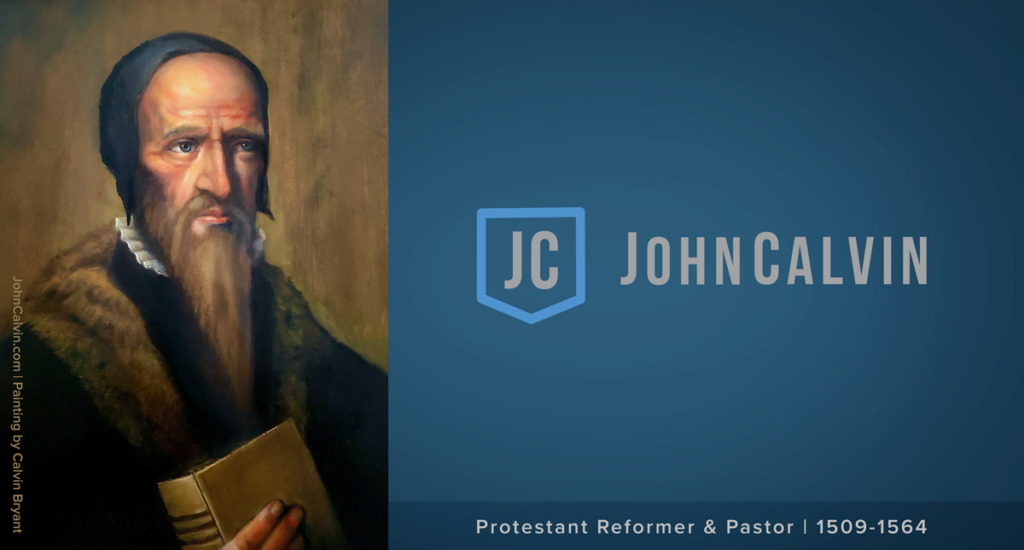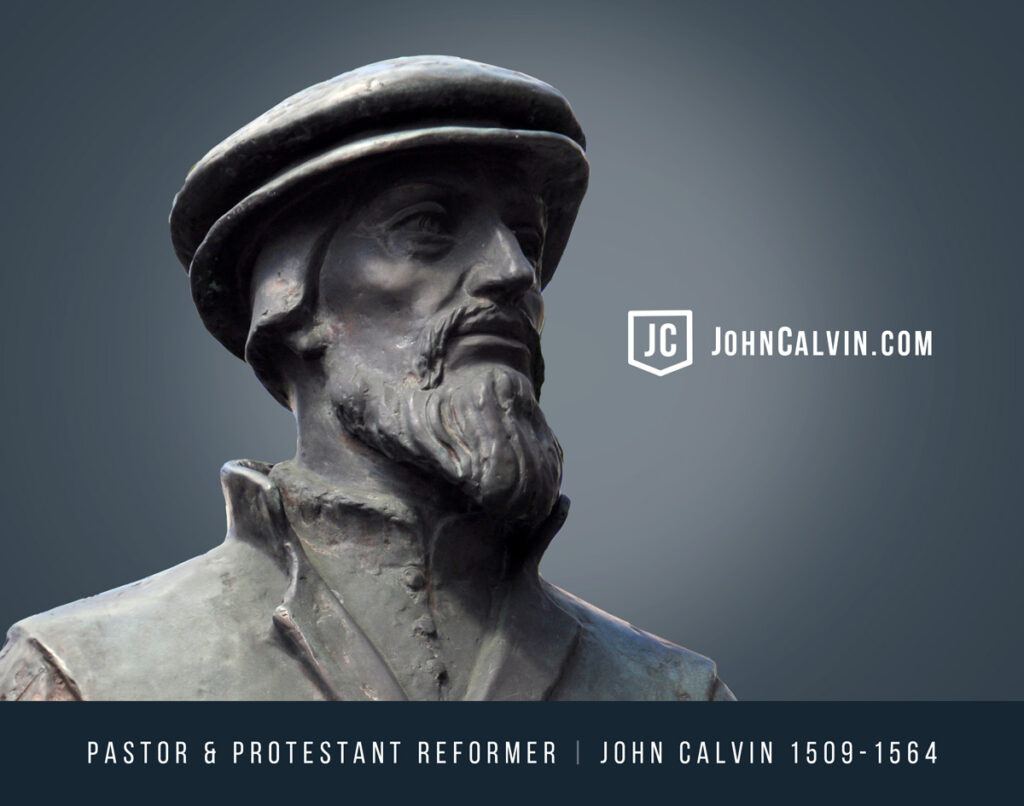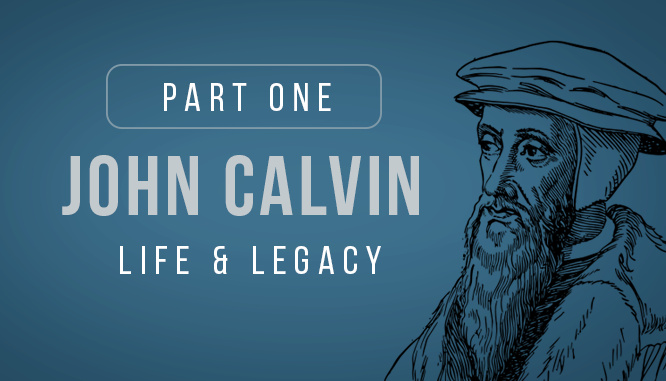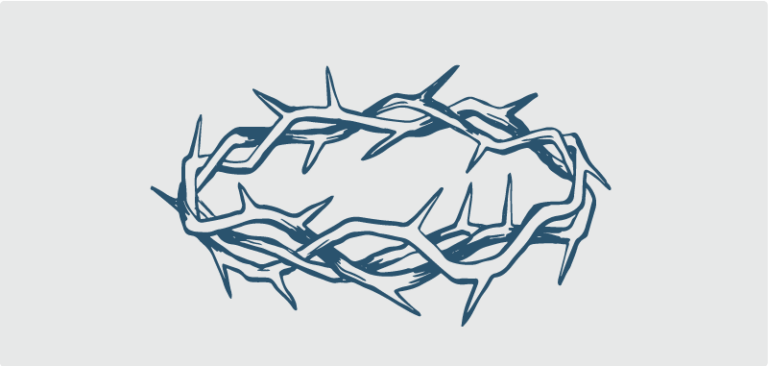John Calvin’s Life & Legacy
Igniting The Fires of Revival

It is hardly disputed that John Calvin is one of the most influential–if not the most influential– of the Protestant Reformers. His life and teaching ignited the flames of revival across Europe and early America. His lasting effect on today’s world goes beyond Reformed theology and touches most spheres of life including governance, early American history, the rise of democracy, and social norms. Even if you do not know it now, your life has been affected by John Calvin. Throughout this 4-part series, we hope to demonstrate Calvin’s great significance both at the time he was alive and now by walking you through milestones, ideas, and events that marked Calvin’s life.
In part one, we will present a brief overview of Calvin’s personal history. In part two, we will seek to explore his various writings and demonstrate the need for more people to pick up and read his works. In parts three and four we will focus on Calvin’s lasting impacts. More particularly, in part three we will examine his immediate impact in Geneva, Switzerland in the 1500s, and in part four will discuss the legacy Calvin has handed down all the way to the present time in the United States. We hope that through this short series on Calvin, you will be inspired to learn more about and from this giant in the faith.
From the Church to the Law
The origin story of our hero begins on July 10, 1509. Although famous for his time in Switzerland, Calvin was born in Paris, France to his mother, Jeanne le Franc, and his father, Gerard Cauvin (French spelling of Calvin). His mother died early in Calvin’s childhood leaving behind him and four siblings.
Calvin’s father was ambitious and hoped to elevate his family’s standing. At the time, France was still heavily Roman Catholic, so Calvin’s father heavily encouraged him to join the official priesthood of the church. Joining the priesthood would ensure a free education and future job security. Calvin, obeying his father, became a servant of the Roman Catholic Church and studied diligently in hopes of upgrading from his humble beginnings. However, as time went on Gerard felt that his son would be better off financially as a lawyer. Calvin then, at the age of 12, went to study law at the University of Paris.
It was there that Calvin pursued subjects such as political philosophy, literature, art, theology, and more. His dad particularly had visions of his son becoming a famous humanities scholar. Toward that end, Calvin dedicated himself to the study of Roman law and philosophy at the Universities of Paris, Orleans, and Bourges. He launched his academic career with the publication of his first complete book in 1532 at the age of 23, a commentary on the Roman leader Seneca.

Back to the Church
During the 1520s and 30s (while Calvin was studying humanities), Martin Luther’s movement for the reformation of the Roman Catholic Church was ricocheting all over Europe. In Roman Catholic France, Luther’s ideas were not readily accepted. Indeed, at Calvin’s own college, there was a mission statement to refute Luther’s beliefs. Calvin seemed unaffected by the Reformed ideas encroaching on Europe. He earned his bachelor’s and master’s degrees and continued onward to peruse a doctorate in philosophy.
Although scholars dispute who exactly exposed Calvin to the ideas of the Protestant Reformation, many suggest that it was his friend Nicolas Cop, the official pastor of Calvin’s University. Once Calvin interacted with Protestant and Reformed teachings, his life completely changed. He writes about this in the preface to his commentaries on the Psalms, saying:
“Thus it came to pass, that I was withdrawn from the study of philosophy, and was put to the study of law, to this pursuit, I endeavored faithfully to apply myself, in obedience to the will of my father; but God, by the secret guidance of His providence, at length gave a different direction to my course. And first, since I was too obstinately devoted to the superstitions of Popery to be easily extricated from so profound an abyss of mire, God by a sudden conversion subdued and brought to a teachable frame my mind, which was more hardened in such matters than might have been expected from one at my early period of life. Having thus received some taste and knowledge of true piety, I was immediately inflamed with so intense a desire to make progress therein, that although did not altogether leave off other studies, I yet pursued them with less ardor,” (Calvin, Commentaries on the Psalms, 1557).
He continued his studies but became passionate about the importance of the Scriptures and the furthering of the Reformed Church.
Public Life
While Calvin was still at university, his friend Nicolas Cop preached a sermon extremely friendly to Protestant teachings. It is rumored that Calvin himself wrote this sermon. Regardless of the authorship, the sermon caused an uproar and forced Cop to flee to Basel, Switzerland. Calvin implicated in Cop’s teachings was also set on the run toward Switzerland.
During his travels, Calvin made many connections with other Reformers (mostly other exiles), including William Farel. William Farel was another Frenchmen who fought hard for the Protestant faith and founded many churches across Switzerland. Farel is responsible for a large number of events throughout the Reformation period, but he is most often known as the man that persuaded Calvin to go to Geneva, Switzerland in 1536.
It was there that Calvin became a public teacher and preacher of the Reformation. Although, both Calvin and Farel were kicked out of Geneva briefly in 1538 for attempting to get rid of all Roman Catholic images of God. They both returned in 1541 and were able to establish a Protestant outpost in Geneva through the preaching and teaching of the Scriptures and through the passionate proclamation of the love of Jesus Christ.
Calvin then helped form a new government in Geneva based on the Word of God, overthrowing any remaining Roman Catholic influences. Here he established an academy for the education of future generations, preached at the local church, started charities for the poor, set up the prototype of church government for future presbyterian denominations, and was a member of the ruling council in Geneva known as the Consistory.
In Geneva, Calvin spent the remainder of his life writing, teaching, preaching, taking in refugees, and training missionaries. It was in Geneva that Calvin began writing his most famous work, The Institutes of Christian Religion. He began writing it at the age of 26 and continued to add and revise it all of his life. Although the Institutes were distributed and read during Calvin’s life, the final version of it was published after his death.
Private Life
Not much is known about Calvin’s home life. He was a particular man and had high standards for any future wife. He was approached multiple times by candidates suggested by friends but remained unmarried until Martin Bucer (a German Reformer) recommended Idelette Stordeur.
Idelette was a widow with two children. Calvin was a frequent guest in her home both while her husband Jean Stodeur was alive and after his death. During those visits, Calvin was able to witness her godly character and admired her graciousness. On August 17, 1540, they were married. Together they lived an active life. The Genevan Consistory granted them a small mountain-top home and a modest annual salary. Idelette is said to have created a warm home and helped Calvin take in many refugees and host multiple future famous theologians.
Idelette and Calvin never had children as they all died at birth or shortly after. This was devastating to both Calvin and Idelette. However, they were committed to prayer and reading the Scriptures to help them deal with their immense grief. In 1549, after nine years of faithfulness to her husband and the Lord, Idelette died. Calvin was faithful to his promise to treat her two children as his own. After the death of his wife, Calvin continued to teach, write, preach, and train future generations of preachers until his own death on May 27, 1564, at the age of 54.
Far-Reaching Influence
Calvin’s missionaries from Geneva went all over the globe in the 1550s including as far as Brazil. In 1555, the Roman Catholic Queen in England and Scotland, Mary Tudor (aka Bloody Mary), exiled all the Protestants. This sent many theologians Calvin’s way, including Scotland’s most famous Reformer John Knox. Calvin housed these exiles, trained them, and sent them throughout Europe carrying the gospel wherever they went. Calvin continued to train many famous theologians including Pierre Viret, Theodore Beza, and Francis Turretin and has influenced millions more.
Conclusion
John Calvin was first and foremost a man of faith dedicated to the pure worship of the one, true, and living God. His whole life was marked by vigorous study and a drive for the precise communication of the truth. After his exposure to the Protestant faith, he funneled his skills and passion into helping reform the church. Calvin’s life is a reminder for us that God can use anyone at any time to proclaim His name. Calvin’s legacy is a call for us to hold fast to the truth of God.
Read more about John Calvin’s doctrines of Reformed Theology
Learn more about the gospel of Jesus Christ and how it can change your life




